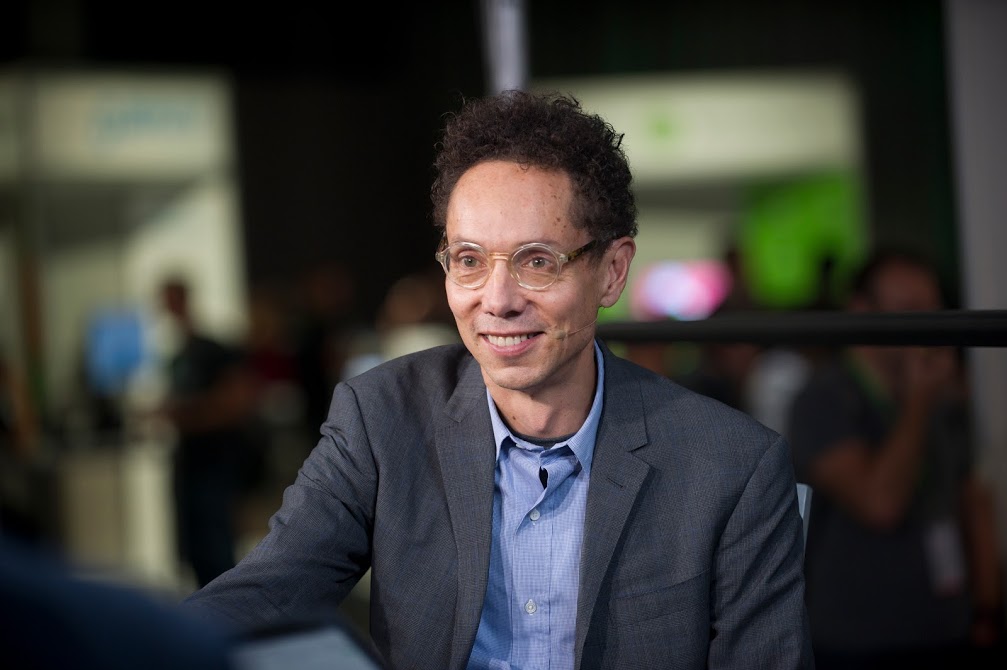 THOUGHT LEADERSHIP
THOUGHT LEADERSHIP
 THOUGHT LEADERSHIP
THOUGHT LEADERSHIP
 THOUGHT LEADERSHIP
THOUGHT LEADERSHIP
Five-time New York Times best-selling author Malcolm Gladwell (@Gladwell) recently published a book titled “David and Goliath,” in which where he examines how the weak can overpower the strong. Gladwell, a popular author, journalist and global thinker, stopped by theCUBE, from the SiliconANGLE Media team, this week to discuss the new, successful entrepreneur and took a look at a world run by robots.
Gladwell spoke with theCUBE co-hosts John Walls (@JohnWalls21) and Jeff Frick (@JeffFrick) during Intuit Inc.’s QuickBooks Connect event held in San Jose, Calif.
This week, theCUBE highlights Gladwell as our Guest of the Week.
Walls began the interview trying to understand what entrepreneurial capabilities it takes to be a good outside the box thinker. Gladwell explained that the definition is expanding and just by looking around Silicon Valley, the evidence is all around.
“Here we are in the middle of Silicon Valley and what this part of the country has done to change the entire culture of the entire loop of the world’s economy in the last 20 to 25 years is nothing short of incredible,” Gladwell said.
He continued: “Entrepreneurship has gone from what people thought of as the province of wackos and weirdos and strange people, to the kind of things that kids aspire to do and be; that’s an amazing transformation. What’s happened over the course of that transformation is we’ve discovered that the definition of what it means to be good is a lot more broader than we thought.”
He added, “Many different kinds of people, using many different kinds of strategies can be effective at starting businesses and achieving. I think that’s been the great take home lesson of this entrepreneurial explosion over the last generation.”
In discussing Gladwell’s book, “David and Goliath,” Walls admitted he is struck by how using one’s advantages and disadvantages, and making the most of one’s strengths can make them successful. “How would you communicate that to a small business owner?” Walls inquired.
“This goes to this issue of learning strategies,” Gladwell answered. “There’s a kind of learning, we’ll call compensation learning, where you are learning out of weakness not out of strength. You’re learning from your failures, and that kind of learning is a lot harder to do, but it’s a lot more powerful. So, the task of the small business owner who is facing a whole series of disadvantages and weaknesses relative to much larger competitors, there is no question; it’s a harder way to go, but if you can pull it off, you’ll end up in a much stronger position.”
He continued, “In the book, I talk about how many entrepreneurs are dyslexic, and that’s a beautiful example of that; some people who suffer from quite a serious disorder … manage to turn that around into an advantage. To take something, [such as] an inability to read, and turn that into developing skills of delegation, leadership and problem solving and developing an incredible resilience, the ability to cope with failure. They turn a weakness into a strength and they end up being far more powerful as a result [of the disability].”
Gladwell added that when he interviewed successful dyslexic entrepreneurs for the book, what was amazing was that all of them said, ‘I did not succeed despite of my disability; I succeeded because of it.’ “And that’s the crux of it,” he stated. “I think there is a silver lining to many of the clouds that small business owners face.”
The conversation then turned to technology, when Frick brought up how artificial intelligence has its benefits, but there is also a dark side where people fear losing their jobs. He asked Gladwell how he sees the future.
“I think it is important not to overstate how much of our lives we will be willing to let machines take over. It’s been very interesting for me as a writer to observe, for example, what happened with eBooks over the last 10 years,” Gladwell said. “EBooks come along and everyone says, ‘The printed book is over … why would you lug around a big, heavy book when you can get it for a fraction of the cost?’ … Well it turns out that a fairly sizable portion of the marketplace want to read a book — a physical object. That’s more pleasurable somehow, the interaction with pages and paper is pleasing.”
He added, “That’s part of the experience. … It’s an important reminder that the interactions and activities that make up our lives are not just functional activities; they are opportunities for enjoyment and engagement. Part of the reason you go to a restaurant is not just to eat the food, but to engage with the people in the restaurant. Part of the pleasure is the person who brings you the wine bottle and gives you a little spiel. Now I can replace that person with a robot, but the question is, do you want to?”
Walls pondered the question of how the next generation will process the AI experience differently. He believes that today we are raising a whole different kind of human because of the interaction with technology. Gladwell sees opportunity.
“What we are going to move to is a world where people will give us whatever kind pleasure or interaction came before … and replace it with another kind of interaction. … I think that is what the world looks like. We get this incredibly complicated mix … in a way that world allows for much richer personal interactions than the one we are in now,” he said.
Watch the complete video interview below, and be sure to check out more of SiliconANGLE and theCUBE’s coverage of QuickBooks Connect.
THANK YOU